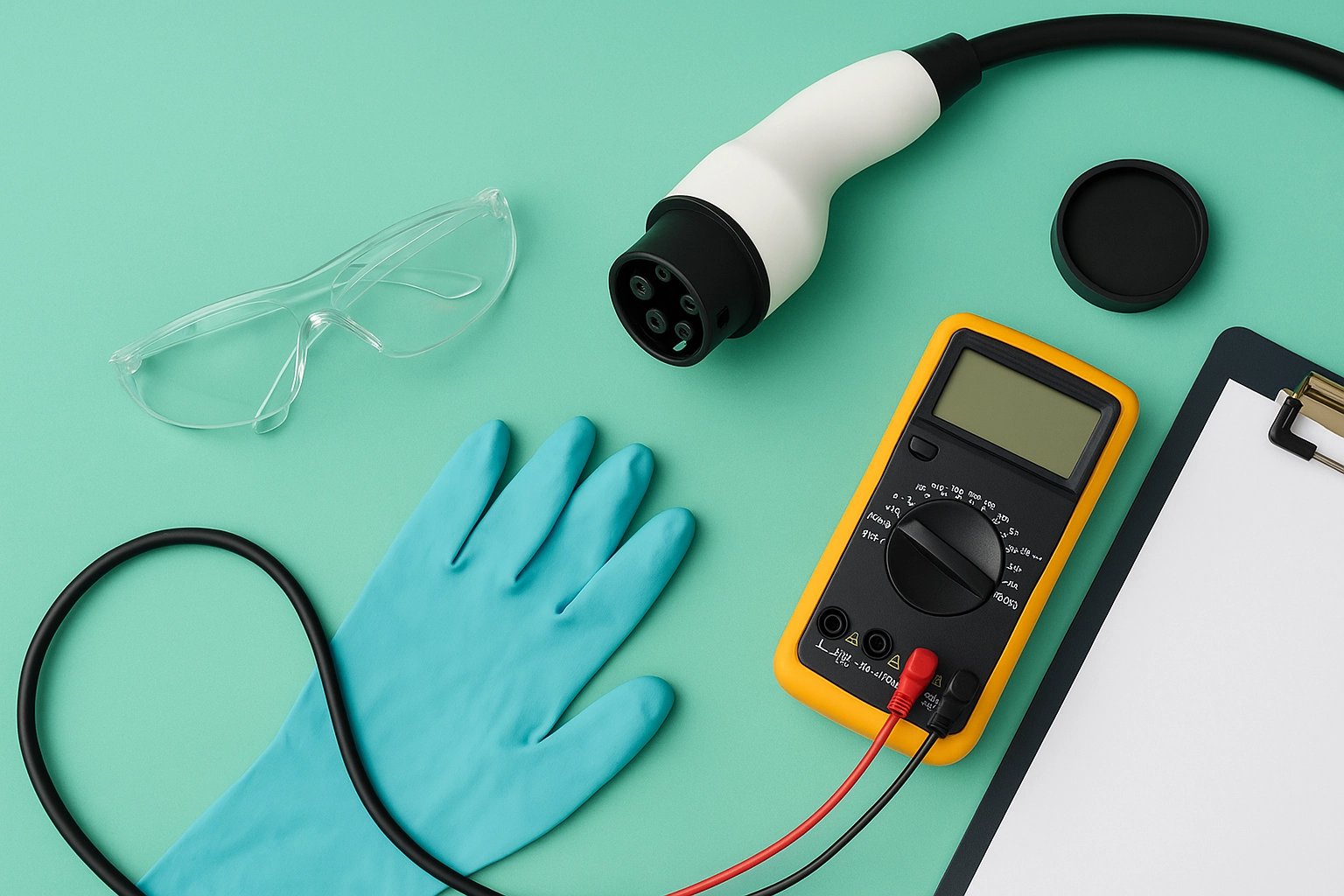SAE J1772 EV Conductive Charge Coupler Test
The SAE J1772 standard is a key specification defining the physical and electrical interfaces for conductive charging of electric vehicles (EVs) in North America. This test ensures that charge couplers, which are essential components of EV charging infrastructure, meet stringent performance criteria to guarantee safe and reliable operation. Compliance with this standard is crucial for manufacturers, ensuring interoperability between different brands and models of EV chargers.
The SAE J1772 standard covers the design and testing requirements of the coupler itself as well as the associated electrical contacts. It specifies the physical dimensions, connector layout, and the electrical characteristics required for a compatible connection. The test includes both static and dynamic conditions to evaluate the mechanical strength and electrical integrity of the charge coupler under real-world usage scenarios.
The testing process typically involves several steps, starting with the preparation of the specimen (the charge coupler), followed by the application of various forces and voltages to simulate actual use. This ensures that the coupler can withstand the stresses and strains it will encounter during installation, operation, and disassembly.
The testing apparatus used in this process includes specialized fixtures capable of applying precise mechanical loads and electrical signals. These fixtures are designed to replicate the conditions encountered by a charge coupler in an EV charging environment. The test parameters include but are not limited to voltage levels, current ratings, contact resistance measurements, and mechanical durability checks.
The results of these tests provide critical data that quality managers can use to ensure product compliance with SAE J1772 standards. Compliance is verified through detailed reports generated by the testing equipment, which include both quantitative and qualitative assessments. These reports are essential for ensuring that each charge coupler meets the necessary performance criteria.
For R&D engineers, this test is particularly important as it allows for iterative improvements in design, helping to identify any potential weaknesses or areas for enhancement. The test also plays a crucial role in procurement strategies by providing data on supplier reliability and quality assurance practices.
Applied Standards
| Standard Number | Description |
|---|---|
| SAE J1772-2021 | Defines the physical and electrical interfaces for conductive charging of electric vehicles. |
| IEC 62196-2:2015 | International standard covering the connector types, dimensions, and performance requirements. |
Scope and Methodology
The SAE J1772 EV Conductive Charge Coupler Test is designed to ensure that the charge couplers used in electric vehicle charging infrastructure meet the highest standards of safety, reliability, and performance. The scope of this test includes evaluating both mechanical integrity and electrical functionality.
During the mechanical testing phase, the focus is on assessing the durability and strength of the coupler under various loading conditions. This involves applying controlled forces to simulate real-world stresses such as those encountered during installation or disassembly. The test also evaluates the coupler's ability to withstand environmental factors that may affect its performance over time.
The electrical testing phase assesses the coupler's ability to maintain a stable and safe connection between the vehicle and the charging station. This includes measuring contact resistance, voltage drop across connections, and ensuring proper current flow without interruptions or failures. These tests are critical for verifying that the coupler can operate efficiently under all expected conditions.
The methodology used in this testing process is rigorous and comprehensive, employing advanced instrumentation to provide precise measurements and detailed analysis. The results of these tests are crucial for quality managers to ensure compliance with SAE J1772 standards and to make informed decisions regarding product development and procurement strategies.
Industry Applications
The SAE J1772 EV Conductive Charge Coupler Test is widely used across various sectors within the automotive industry, particularly in areas focused on electric vehicle infrastructure. Quality managers and compliance officers rely heavily on this testing to ensure that all components of an EV charging system meet strict safety and performance standards.
R&D engineers use these tests as part of their continuous improvement efforts, ensuring that new designs are robust enough to withstand the demands placed upon them in real-world applications. Procurement professionals benefit from detailed test results when selecting suppliers who can provide high-quality components consistently meeting industry standards.
The importance of this testing cannot be overstated; it directly impacts public safety by reducing risks associated with faulty or non-compliant charge couplers. By adhering to SAE J1772 guidelines, manufacturers contribute significantly to enhancing the overall reliability and consumer confidence in electric vehicle technology.





